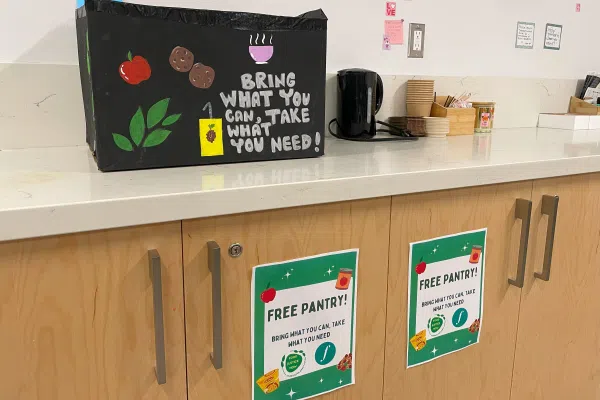
The Food Justice Now pantry and donation box, free for anyone to use. (Gus Hunt, CMRU.ca).
Food Justice Now is a project aiming to tackle rampant food insecurity among students. The project exists under the University of Calgary club, Students for Direct Action. Recently, FJN set-up a free food pantry in the campus’ arts lounge meant to provide barrier-free access to food for all students. Other options for students facing food insecurity at UCalgary include the Student Union’s food bank, however using that requires students go through a lengthy approval process. FJN’s pantry doesn’t have any approval process and encourages students of any background or status to take advantage of it. Dania Samih, SDA’s secretary, says the food bank’s approval process can be “re-traumatizing for food insecure students.” The pantry has cabinets stocked with ramen noodles, snacks, drinks, and a donation box for students to leave other items.
To see Samih and fellow FJN member, Keely O’Neill, set up the free food pantry, watch here:
Over half of Canadian students face food insecurity
A national charity, Meal Exchange, conducted a survey in 2021 on food insecurity in 13 Canadian universities. It found that in fall 2021:
- 56.8 percent of students experienced food insecurity.
- 36.1 percent of students experienced a moderate level
- 20.7 percent experienced a severe level.
- 66.1 percent of UCalgary students experienced food insecurity.
- 41.5 percent of UCalgary students reported a moderate level.
- 24.6. percent of UCalgary students reported a severe level.
When asked about what she’s personally witnessed, Samih stated “I know for a fact that a lot of students right now are dropping out of school because they can’t afford to eat and pay tuition.” FJN takes a number of steps towards fighting food insecurity, including the pantry. They also have monthly cooking sessions where members and volunteers spend the day cooking, and serve the meals for free later. The last cooking session produced 150 meals, but FJN hopes to receive more funding in the future and significantly increase their output.
I sat down and interviewed Samih on how FJN came to be, and what it hopes to accomplish:
Author’s reflection
I’ve spent a lot of time this year around student-led grassroots organizations and learning about the worsening condition of student life in Alberta. In the spring, I interviewed the VP External of UCalgary’s Student Union, and reported on the massive provincial budget cuts for post-secondary schools, and there is a clear trend. Students everywhere, but especially Alberta, are suffering for their education. On top of seemingly unending tuition increases, students can barely afford to eat, and Calgary’s in a housing crisis. One-room student apartments at the Hub cost upwards of $1000 per month, and I’ve personally met students who nearly had to drop out because of a close brush with homelessness. International students have it even worse, with their tuition already costing several times more than domestic students, matched with a higher cap on increases, not to mention the fact that they can be deported if they need to drop out.
My peers are being left behind by the institutions meant to serve them, and it’s on other students to pick up their slack. It’s both inspiring and heartbreaking to see groups like FJN. Inspiring because of the drive and dedication it takes to put so much towards uplifting your community. Heartbreaking because groups like FJN shouldn’t need to exist in the first place; students, or anyone, starving shouldn’t be a fact of life, yet it’s completely normalized. FJN and Dania Samih show there’s good in the world, but also that this world is not good.




Comments